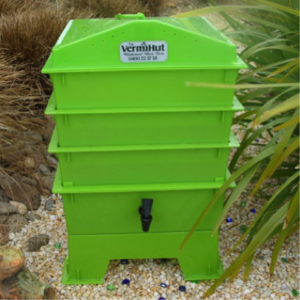
-Luis Guerra-
Every spring, many of us rush out to our local garden centers in search of rich organic compost for amending our home gardens. We typically encounter many brands of bagged compost that are derived from different organic sources. Hopefully we find a local, regional, or even national organic copost brand that we can trust, depending on where we shop.
But what if you could make your own compost with just a few square feet of space in your home or garage? What if I told you that keeping Red Wiggler worms in your home is clean, doesn’t stink, and is so efficient that you can turn your everyday kitchen and garden scraps into ‘Black Gold’ with little effort? Well, all that is true. Vermicomposting is efficient, and fairly mess and stress-free once you know what you are doing.
Now there are many schools of thought on the subject of worm bin composting and countless videos on YouTube explaining how worms can compost your organic matter. I’m here to clear up that smokescreen of information and simplify the process for the everyday gardener.
Red Wigglers are the most aggressive composting worms available (no argument there), as they consume about half their body weight in food scraps per day. They typically live within the first three inches of their living space, which make it easy to feed them.
There are only a few simple ‘do not’ rules you need to remember to maintain a healthy environment within your worm bin composter:
- Do not feed your worms meat or dairy scraps.
- Do not add any alliums (onions or garlic) to your bin, as they will smell.
- Do not add any pet manure (cat litter) to your worm bin.
Make sure to give your worms plenty of bedding (shredded newspaper, coco coir) and they will do the rest.
We currently have fresh, live Red Wiggler worms for sale at our Carrboro and Asheville locations. Worms are are available on a periodic basis, so please call your local Fifth Season location about ordering worms, or to see when the next batch may be coming in to your store.
As far as worm bins are concerned, we recommend either the Urban Worm Bag or the Vermihut Worm Composter System for beginning vermicomposters. They are both simple to use and work well.



Mary Ann says
Thanks for the good informative article. I’ve had Red Wigglers for five years now, and I think it is a “no-brainer” to divert great organic waste from the landfill and let the worms convert it to an amazing soil amendment! And like you said, no mess, no stress. I don’t think I could even garden now without wonderful worm compost. Thanks for providing products that promote sustainable and restorative farming practices!
ashley says
Thanks for the kind words! And for sharing your positive experience vermicomposting. It really is a great practice for so many reasons.
Karl says
WOW Super kool info! Thank You, Looking forward
to reading more while visiting this wonderful sit.
Tasha Alcorta says
Fifth Season Gardening,
Thank you for the information on your website. It is very insightful. I have some confusion in regard to the actual steps involved in using them. I get the idea, but what about when I am ready to use the compost? Do I separate the worms from the compost by hand or just dig into the compost and hope the worms survive where I use it? Do I have to keep buying worms every season? I am confused but hopeful that you will clear this up for me.
Tasha Alcorta
brian says
Thanks for your question. For the two systems shown in this article, the fresh scraps are added to the top and the compost is harvested from the bottom. Your worms will naturally move towards the fresh food scraps that you add to the top. When harvesting, if some worms are mixed in with the compost, just add them to your garden and they will keep up the good work there. Also, if conditions are right, your worm population will multiply in the composter as well. Hope this helps and best of luck!